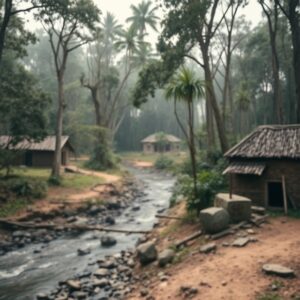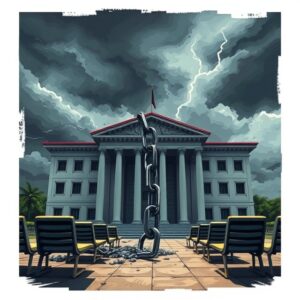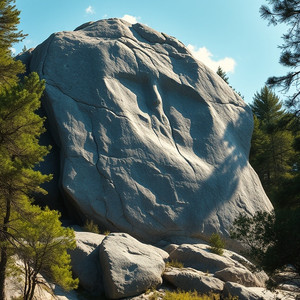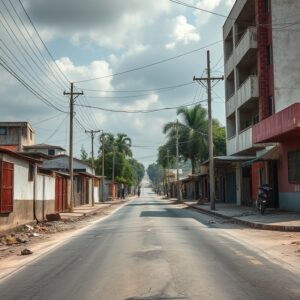The Lighthouse Keeper’s Final Night: Oba Island Mystery
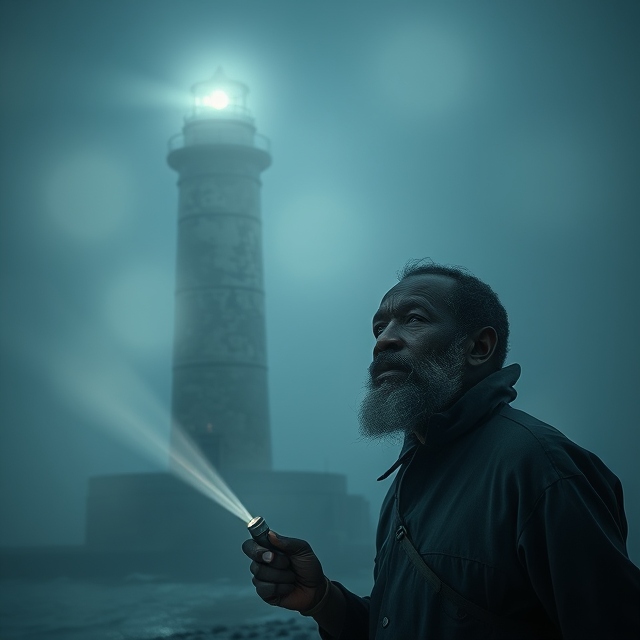
An aged lighthouse on Oba Island, shrouded in mist, with faint shadowy figures near the shore.
The Lighthouse Keeper’s Last Note: Chronicles of Oba Island
The sharp, distant crash of waves broke against the rocky shores of Oba Island as the wind howled through the skeleton-like frame of the old lighthouse. The light stood tall and defiant against the ever-changing skies, casting its steady glow out toward the horizon. It was here, in this cold, windswept place, that the last note of the lighthouse keeper would be found—hidden in the folds of time and weather.
On the evening of September 14, 1973, the lighthouse keeper Samuel Adebayo prepared for his routine shift, unaware that this would be his final descent into the mysteries of the sea. Samuel was a tall, sinewy man in his fifties, his skin weathered from years of exposure to salt and sun. His hands were rough from work, and his voice was low and deliberate when speaking. His wife, Mama Tola, had warned him as they ate dinner earlier that day, “Make sure to lock the light tightly tonight. We’ve been having reports of strange movements near the shore.”
Samuel chuckled. “Strange movements are always a part of this job, Tola. Don’t let tales bother you.”
But as he made his way to the lighthouse tower that night, the air felt different. It wasn’t fear. It was just enough uncertainty to make him pause.
Oba Island was small. In fact, it was mostly fishermen and tradesmen who kept the island afloat. The lighthouse was the lone guardian here, watching over ships entering the bay, guiding them safely through the treacherous rocks. Samuel loved this job. He loved the quiet, the precision, the rhythm of life dictated by tides and stars. His life felt simple but fulfilling, and the people of the island always brought him fresh fish and bread when he came to shore.
This particular evening, the wind had a sharp bite, colder than Samuel remembered. It felt as if it came from a far-off, unseen place. He tried to shake the feeling as he climbed the metal spiral staircase, gripping the rail with his strong, weather-worn hand. The beacon light was intact, glowing steady as it swept its pale beam into the distance. His duties were simple: keep the light steady and ensure the lamp was working properly. Samuel knew that once his shift was done, he could retire to his small, modest room, a space he kept tidy, with his favorite Yoruba proverbs and old Christian hymns written in scraps of paper on the wall.
But the hum of the wind, the creak of the lighthouse structure, and the sound of waves felt sharper that evening. His hands trembled as he adjusted the light, staring out toward the horizon. His heart felt tight. Samuel knew this was not normal weather. His thoughts kept straying to the tales—talks of lost ships, mysterious figures in the dark, and strange movements that the fishermen spoke of.
He tried to brush it off as fatigue, but before he could make his way back down the stairs, a sound caught his attention.
It was soft. A faint creaking sound, so slight that it could have come from the wind. Samuel paused, gripping the handrail tightly as his heart began to beat faster. His breath came short. His instincts told him to check, though he wasn’t certain what he was checking for. Perhaps it was nothing at all.
He looked toward the path leading to the edge of the island, his eyes straining against the heavy mist. And that was when he saw it—a faint shadow at the edge of his vision, just barely illuminated by the lighthouse’s beam.
It wasn’t the wind. It wasn’t a trick of the light. Samuel knew he wasn’t imagining things. His pulse thundered in his chest as he peered into the mist. A sound came again, closer this time. His eyes narrowed. His thoughts scrambled. He reached for his radio to contact the local coast guard, but the static-filled hum of interference greeted him.
By the time he had climbed down the stairs, his hands trembling, Samuel felt the full weight of uncertainty. His radio, now completely useless, felt like another layer of isolation.
The wind picked up as he stepped onto the ground. Samuel’s breath came fast, the sharpness of the air biting at his face. His boots hit the pebbly sand, and he strained his eyes toward the distant tree line, the shape of the old fishing pier just barely visible in the mist. He thought of his wife, Tola, and of home, and how he could hear her laughter as she teased him during dinner about sea stories.
Samuel began to walk, his heartbeat loud in his chest, his steps heavy and deliberate. He thought he might find something at the water’s edge—perhaps a bird, a shipwreck, or just his imagination. But what he found in the mist shook him.
The sound of footsteps. The sound of movement in the water. A low, guttural moan.
Samuel froze. His heart felt as though it would tear from his chest as he fought the urge to flee. His body was trembling, and his mind told him, stay calm, stay logical, Samuel.
But nothing felt logical. The noise was coming closer. Samuel could hear the creaks of wood and the sound of someone—or something—moving through the shallow waves. His breath came sharp and rapid as his mind grappled with fear and logic. His hands clutched his flashlight tighter as he prepared to face what lay ahead.
And then, nothing.
The sound stopped. The wind stilled for a brief moment, and the mist felt colder.
Samuel knew he would never return to the lighthouse the same way.
The next morning, Samuel’s body was found, his hands clutching a piece of paper. The note was wet and smudged with saltwater, but his last words were clear.
“They know the tides. The light will not last unless I leave this beacon steady.”
The investigation remained inconclusive. Some believed Samuel had encountered a phantom or a sea spirit, while others thought his death was simple weather-related fatigue. But the cryptic words in his note left many unanswered questions.
Was Samuel’s death a warning? Had he known something the rest of the island did not?
The records of the investigation are buried deep in the archives of the Oba Coast Guard, and though Samuel’s body is long gone, his lighthouse still burns. The beacon’s glow keeps watch over the waves, steady, constant, just as Samuel would have wanted it.
But on nights when the wind grows colder, and the mist rises higher, some say they can still hear footsteps—near the old lighthouse, walking toward the horizon.


